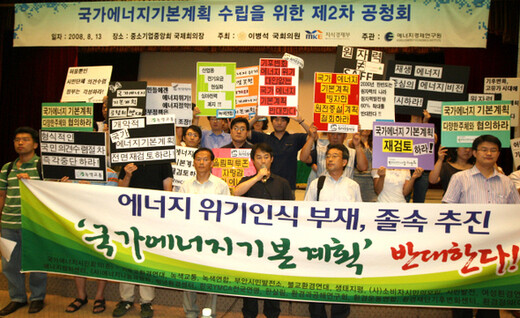hankyoreh
Links to other country sites 다른 나라 사이트 링크
11 nuclear power plants to be built by 2030

The government has decided to build 11 more nuclear power plants by 2030, boosting the percentage of power generated by nuclear energy from the current 26 percent to 41 percent. It has also decided to boost the percentage generated by renewable energy sources from 2.24 percent to 11 percent.
The government held its second public hearing on its national energy plan at the Korea Federation of Small and Medium Business on August 13 to announce its forecasts and plans for energy provision through 2030. The final plan will be decided in a national energy commission meeting chaired by the president at the end of the month. It is expected to be rough ride, however, as civil society is condemning the plan as a strategic plan for nuclear energy rather than a comprehensive energy plan.
The government plan calls for the construction of 11 new 1.4 million kilowatt nuclear reactors like the No. 3 and 4 reactors of the Sin-gori nuclear power station by 2030. To do this, the government will select two or three candidate locations by 2010. Moreover, with much controversy expected over the construction of storage facilities for highly radioactive spent nuclear fuel, the government decided to hold public hearings on the matter after 2016.
The government also decided to strengthen research into four core sectors to boost renewable energy supplies -- solar, wind, hydrogen fuels and Integrated Gasification Combined Cycles, or IGCC. Together with this, in order to optimize and rationalize the energy market’s price structure, the government decided to gradually switch the price structure from the current one, in which energy costs are partially based on usage, to one based on prime cost. It also seeks to boost independent oil production from its current 3.2 percent to 40 percent by 2030 by actively participating in domestic and overseas oil field development.
The Citizens Committee on Energy, composed of 19 civic groups, released a statement on August 13 criticizing the government plan as ignoring the importance of regulating total energy demand in favor of simply boosting energy supply through independent development and nuclear energy expansion. The group wondered whether the plan was simply a means ((of expanding nuclear energy production, expressing concern for social tensions surrounding the selection of nuclear plant sites and nuclear waste processing. Mechanical engineering Professor Park Gyeong-pil of Yonsei University said the nation could not avoid building nuclear power stations, but it needed to be a last resort. He said the government was simply going with the easiest choice.
Please direct questions or comments to [englishhani@hani.co.kr]
Editorial・opinion
![[Column] Season 2 of special prosecutor probe may be coming to Korea soon [Column] Season 2 of special prosecutor probe may be coming to Korea soon](https://flexible.img.hani.co.kr/flexible/normal/500/300/imgdb/original/2024/0426/3317141030699447.jpg) [Column] Season 2 of special prosecutor probe may be coming to Korea soon
[Column] Season 2 of special prosecutor probe may be coming to Korea soon![[Column] Park Geun-hye déjà vu in Yoon Suk-yeol [Column] Park Geun-hye déjà vu in Yoon Suk-yeol](https://flexible.img.hani.co.kr/flexible/normal/500/300/imgdb/original/2024/0424/651713945113788.jpg) [Column] Park Geun-hye déjà vu in Yoon Suk-yeol
[Column] Park Geun-hye déjà vu in Yoon Suk-yeol- [Editorial] New weight of N. Korea’s nuclear threats makes dialogue all the more urgent
- [Guest essay] The real reason Korea’s new right wants to dub Rhee a founding father
- [Column] ‘Choson’: Is it time we start referring to N. Korea in its own terms?
- [Editorial] Japan’s rewriting of history with Korea has gone too far
- [Column] The president’s questionable capacity for dialogue
- [Column] Are chaebol firms just pizza pies for families to divvy up as they please?
- [Column] Has Korea, too, crossed the Rubicon on China?
- [Correspondent’s column] In Japan’s alliance with US, echoes of its past alliances with UK
Most viewed articles
- 1[Column] Season 2 of special prosecutor probe may be coming to Korea soon
- 2‘We must say no’: Seoul defense chief on Korean, USFK involvement in hypothetical Taiwan crisis
- 3Is N. Korea threatening to test nukes in response to possible new US-led sanctions body?
- 4Amnesty notes ‘erosion’ of freedom of expression in Korea in annual human rights report
- 5Division commander ordered troops to enter raging flood waters before Marine died, survivor says
- 6N. Korean delegation’s trip to Iran shows how Pyongyang is leveraging ties with Moscow
- 7[Editorial] Korea’s surprise Q1 growth requires objective assessment, not blind fanfare
- 8Is Japan about to snatch control of Line messenger from Korea’s Naver?
- 9No good, very bad game for Korea puts it out of Olympics for first time since 1988
- 10[Reportage] On US campuses, student risk arrest as they call for divestment from Israel